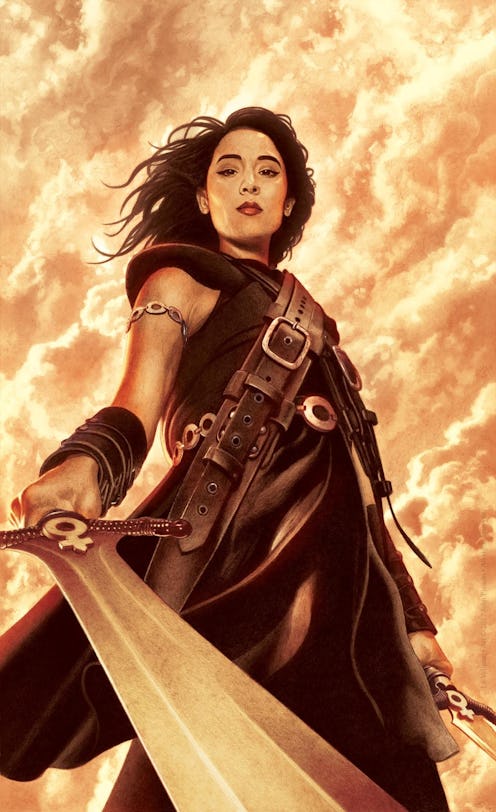
If you were unlucky enough to be awake and moderately sentient during the last year, you are likely acutely, brutally aware of the prevalence of toxic masculinity. It's easy enough to place the blame on Donald Trump, but in truth, this is disease that has long festered in the innards of this country, and many others. The toxicity of rigid masculinity permeates our consciousness in subtle, insidious ways, and dismantling systems of oppression requires both widespread, public action, and small, quiet acts of daily resistance. Award-winning cover designer and illustrator John Picacio is doing the latter in an unusual way: he's expanding what it means to be brave by reimagining the Mexican Lotería card "El Valiente" as a woman.
"I'm not trying to rethink the definition of bravery, as much as expand the spectrum for who gets depicted as brave," John Picacio tells Bustle. "I'm 100% Mexican American and I'm an illustrator living in an era that doesn't play by the same rules as when the traditional Loteria cards were illustrated... Histories evolve. The past sometimes whispers lost truths."
John Picacio, a San Antonio native whose work includes illustrations for A Song of Ice and Fire by George R. R. Martin, X-Men, and Star Trek, is giving the entire Lotería deck a sci-fi twist as a passion project. Lotería, like bingo, is a game of chance, but you play with visual icons instead of numbers. These images are bold, vivid representations of people and objects — everything from El Corazon (heart) to La Estrella (star) to La Sirena (mermaid). Among the most recognizable of these cards is El Valiente, the brave man, who is shown holding a knife with blood dripping from its tip, as though he's just gutted another in a one-on-one duel. As the male pronoun "el" indicates, this personification of bravery is always male.
It's not hard to spot the flaws in this imagery: that bravery should be conflated with violence is problematic, as is the idea that bravery is a uniquely male characteristic. Both are reflective of a culture in which machismo still viciously threads through daily life. In rethinking the card as a woman, Picacio wanted both to celebrate his Mexican-American heritage and his love for the card game, while also providing a model of female strength and an alternative to an oppressive, outdated idea of bravery. In illustrating the card, he turned to fellow San Antonian, Daniela Riojas, for inspiration. She is the model upon whom his "La Valiente" card is based.
"She's a warrior — a hellacious, relentless creative," he says of Riojas, an artist and the frontwoman for Latin alternative band Femina-X. "I use family and friends as reference models for my Loteria drawings all the time, but I'll often change their features to fit the characters in my head. I didn't do that here with Daniela because she was the character in my head. She and I find ourselves fighting on the same side of so many social and cultural struggles."
Riojas tells Bustle that modeling as La Valiente meant "channeling all the brave, strong, resilient, genius women in my life who have become pillars in community and family."
"The machismo impersonation of bravery does not do justice to the complexity of what bravery really looks like," she says.
La Valiente Poster, $30, Lone-Boy
For these two artists, celebrating and honoring their Mexican-American heritage is not at odds with pushing for evolution. "Lotería is its own mythic lineage. It carries within it placeholders of culture that are dear to us, but I think it's important to note how they can also be subliminally oppressive," Riojas says. "As we move forward in our conversations of social justice for women, LGBTQ communities, people of color, the economically disparaged — we are inevitably changing the cultural consciousness of our society. It's inevitable that icons and myths will change with them."
Picacio agrees. "Those cards are more than just a game I've played with my family since I was little," he says. "They're gateways into stories for me. I look at our culture and I feel so often that we're a people trapped in between pasts and futures that belong to others. I'm not interested in living within those traps. I'm keen to see us evolve how we see ourselves and what we permit ourselves to dream. I want to be a part of that renaissance and that's why people like Daniela are a constant inspiration right now."
These updated illustrations serve a number of purposes: they are a beautiful tribute to a culture that is often misrepresented or unfairly appropriated, but they are also an act of resistance in a world where oppression is built upon a foundation of small, seemingly innocuous blocks of inequality. In giving this iconography a feminist update, these artists are paying tribute to their culture in the most powerful way imaginable.
"As I said before, Lotería is personal, and those icons are like family to millions upon millions of Mexican people like us. So I'm now presenting a new family of myths, legends and future pasts. It's time for my 'La Valiente' to enter the world and for me to keep working toward the next Lotería pieces," Picacio says. "Every time I do, it feels like coming home."
You can purchase John Picacio's La Valiente illustration as a poster at Lone Boy.